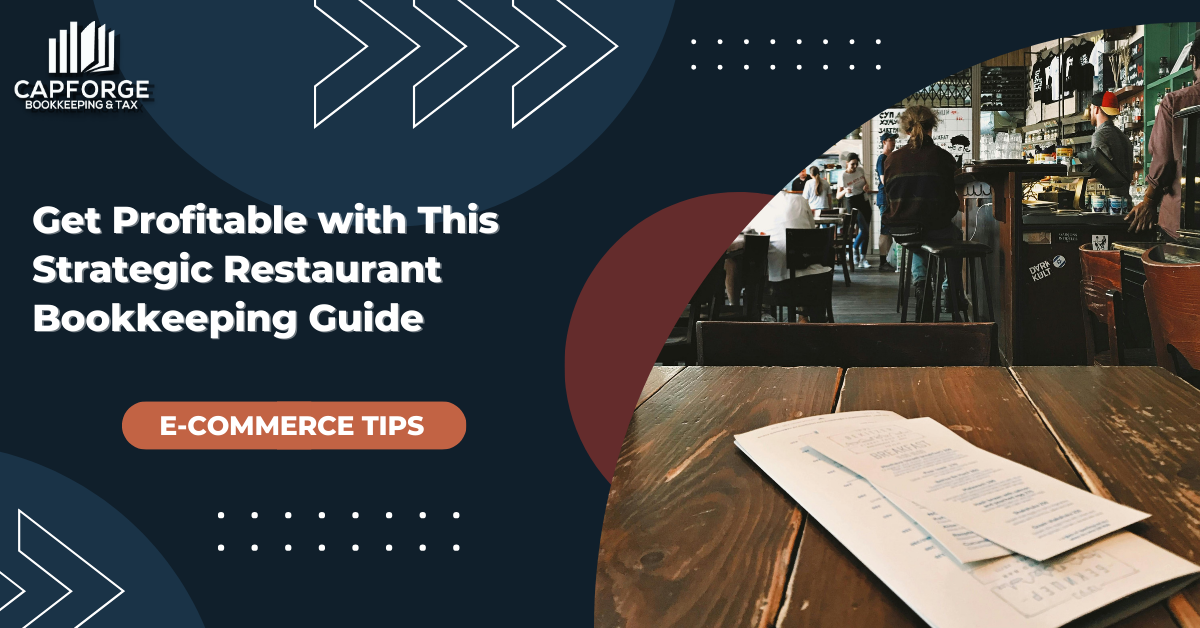Get Profitable with This Strategic Restaurant Bookkeeping Guide
There’s more to running a restaurant than just serving good food. To consistently grow your business, you have to make sure that your profit margins are on point. How do you achieve this? Through strategic restaurant bookkeeping.
Whether you’re just starting a small neighborhood eatery or currently operating a fine dining establishment, it’s worth taking a deep dive into your financial records to further boost the profitability of your business. Learn how to achieve this by reading our blog post!
The Importance of Bookkeeping for Restaurant Profitability
Efficient bookkeeping serves as the backbone of financial management, providing crucial insights into the financial health and performance of your restaurant. Here’s why bookkeeping is essential for restaurant profitability:
- Accurate Financial Records
Bookkeeping ensures that all financial transactions, including sales, expenses, and payroll, are accurately recorded. Without proper record-keeping, it’s challenging to track revenue streams and identify areas where costs can be minimized or revenue increased.
- Cost Analysis and Control: Maintaining detailed records of expenses allows restaurant owners to analyze costs and control them in the most efficient way possible. This analysis can help identify areas where expenses are high or where costs can be reduced without compromising quality.
For example, restaurant owners can track ingredient costs and monitor inventory levels, restaurants can optimize purchasing decisions and minimize food waste.
- Budgeting and Forecasting: Bookkeeping provides the data necessary for budgeting and forecasting future financial performance. With financial records sorted, restaurant owners can set realistic financial goals, allocate resources efficiently, and plan for future growth. This proactive approach helps prevent overspending and ensures that the business remains financially sustainable in the long run.
- Tax Compliance: Accurate bookkeeping ensures compliance with tax regulations and helps minimize tax liabilities. Having organized financial records throughout the year makes it easy for restaurants to prepare tax returns and take advantage of available deductions and credits. This reduces the risk of costly errors or audits and ensures that the business remains in good standing with tax authorities.
- Decision-Making Support: Timely and accurate financial information provided by bookkeeping enables informed decision-making. Whether it’s deciding on menu pricing, expanding operations, or investing in new equipment, having access to up-to-date financial data allows restaurant owners to make strategic decisions that contribute to profitability and long-term success.
Effective Strategies for Restaurant Bookkeeping
Boosting restaurant profitability starts with implementing bookkeeping strategies that will help optimize your financial records. To get started, consider the following tips:
1. Cost-control
Implementing cost control measures ensures that expenses are managed efficiently, allowing restaurants to maintain healthy profit margins even in competitive markets. Managing costs can also prove beneficial to a restaurant’s resource allocation, thereby reducing waste and maximizing profit per ingredient.
- Ingredient Cost Management
To optimize ingredient costs, restaurants can implement several strategies. Start by analyzing ingredient usage patterns to identify opportunities for bulk purchasing or sourcing alternatives without compromising quality. Maintaining a tight inventory control system also helps in minimizing waste and spoilage.
Consider negotiating favorable pricing with suppliers and regularly reviewing contracts to contribute to even more savings.
- Labor Cost Tracking
Implementing systems to monitor and control labor expenses is crucial for managing costs effectively. Restaurants can utilize scheduling software to optimize staffing levels based on demand and avoid overstaffing during slow periods.
Tracking employee hours accurately ensures compliance with labor regulations and helps identify areas where operational efficiency can be improved, such as reducing overtime or streamlining workflows.
2. Revenue Optimization
Revenue optimization enables restaurant owners to capitalize on their existing resources and assets. This is done by strategically pricing menu items, promoting high-margin products, and implementing effective sales strategies.
When executed correctly, restaurant owners maximize the revenue generated from each customer visit and increase overall profitability without significant additional investment.
- Pricing Strategies: Effective pricing models can significantly impact a restaurant’s revenue. Restaurants can employ strategies such as menu engineering to highlight high-profit margin items and adjust prices based on demand and competition. Additionally, offering value-added meal bundles or promotions can attract customers while maximizing revenue.
- Sales Analysis: Utilizing sales data is essential for enhancing menu offerings and overall profitability. Analyzing sales trends allows restaurant owners to identify top-selling items, implement seasonal variations, and serve menus that align with customer preferences.
3. Cash Flow Management
Proper cash flow management enables owners to make informed decisions, plan for future investments, and seize growth opportunities, ultimately supporting the long-term success and sustainability of the restaurant. This ensures the smooth operation of the business by maintaining adequate funds to cover the expenses.
- Inventory Management: Techniques for minimizing waste and controlling inventory costs are crucial for cash flow management. Restaurants can implement inventory management software to track stock levels, set par levels, and automate reordering processes. Regular inventory audits help identify slow-moving items or potential discrepancies, enabling timely adjustments to minimize inventory holding costs.
- Vendor Negotiations: Negotiating favorable terms with suppliers is essential for controlling costs and improving cash flow. Restaurants can leverage their purchasing volume or explore partnerships with preferred vendors to negotiate discounts, rebates, or extended payment terms. Building strong relationships with suppliers based on trust and reliability can lead to mutually beneficial agreements that support long-term financial health.
What is the Best Accounting Software for Restaurant Bookkeeping?
Accounting software is a valuable tool for restaurant owners as it helps streamline financial management, provides actionable insights, improves inventory control, and simplifies tax compliance. When it comes to choosing the best accounting software, you want to consider the following:
1. Integrated Point of Sale (POS) Systems:
Integrated Point of Sale (POS) systems are a crucial component of accounting software for restaurants. These systems seamlessly connect with the restaurant’s accounting software, allowing for real-time synchronization of sales data, inventory levels, and financial transactions.
Restaurant owners can streamline operations and improve efficiency in several ways:
- Accuracy and Efficiency: Integrated POS systems eliminate the need for manual data entry, reducing the risk of errors and saving time for restaurant staff. Sales transactions, including revenue and payment information, are automatically recorded in the accounting software, ensuring accuracy and efficiency in financial reporting.
- Inventory Management: POS systems integrated with accounting software enable automatic updates to inventory levels as items are sold. This real-time inventory tracking helps restaurant owners maintain optimal stock levels, prevent shortages, and minimize food waste. By accurately monitoring inventory, restaurants can control costs and ensure that popular menu items are always available to customers.
- Financial Reporting: Integrated POS systems provide valuable sales data that can be used for financial analysis and reporting. Restaurant owners can access detailed reports on sales performance, revenue trends, and customer preferences directly from their accounting software. This information enables informed decision-making and strategic planning to optimize menu offerings, pricing strategies, and marketing efforts.
- Customer Insights: POS systems integrated with accounting software capture valuable customer data, such as purchase history and preferences. This information can be used to personalize marketing campaigns, reward loyal customers, and enhance the overall dining experience. By leveraging customer insights, restaurants can increase customer satisfaction and loyalty, driving repeat business and revenue growth.
2. Cloud-based Accounting Software
Cloud-based accounting software offers numerous benefits for restaurants, providing flexibility, accessibility, and scalability to meet the evolving needs of the business. Here’s a closer look at how cloud-based accounting software can benefit restaurant owners:
- Accessibility: Cloud-based accounting software allows restaurant owners to access financial data anytime, anywhere, using any internet-enabled device. This accessibility is especially valuable for restaurant managers who need to monitor operations remotely or on the go. Whether accessing sales reports from a mobile device or reviewing inventory levels from a laptop, cloud-based accounting software ensures that critical financial information is always within reach.
- Data Security: Cloud-based accounting software offers robust security features to protect sensitive financial data from unauthorized access or cyber threats. Leading cloud providers implement advanced encryption protocols, regular data backups, and multi-factor authentication to safeguard customer information and maintain compliance with industry regulations.
- Scalability: Cloud-based accounting software is highly scalable, allowing restaurant owners to adjust resources and functionality as their business grows. Whether opening new locations, expanding menu offerings, or increasing staff, cloud-based solutions can easily accommodate changing needs without the hassle of installing additional hardware or software. This scalability ensures that restaurants can adapt to market trends and seize growth opportunities without outgrowing their accounting system.
- Cost-Effectiveness: Cloud-based accounting software offers a cost-effective solution for restaurants, eliminating the need for upfront investment in hardware, software licenses, or IT infrastructure. Instead of purchasing and maintaining expensive servers or software licenses, restaurant owners can subscribe to a cloud-based solution for a predictable monthly fee. This subscription-based model typically includes software updates, technical support, and scalability options, allowing restaurants to allocate resources more efficiently and focus on driving business growth.
Conclusion
Strategic bookkeeping is more than a back-office function when operating a restaurant. It serves as the foundation of effective financial management, aiding business owners in budgeting, forecasting, decision-making, and tax compliance. With reliable financial records in place, restaurant owners can maximize profitability and stay competitive for the long term.
If you’re in need of expert help regarding bookkeeping, accounting, and tax, look no further than us. Our team here at CapForge is ready to provide tailor-made services that fit your every requirement. To learn more, feel free to fill out the form below, and we’ll get back to you as soon as possible.








